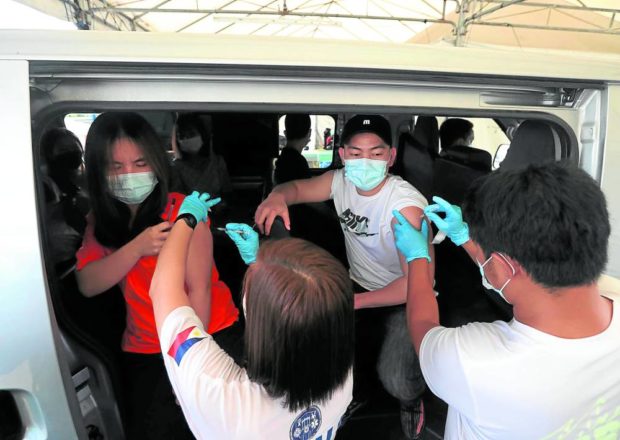
LAST DAY People take their COVID-19 vaccine shots at Quirino Grandstand in Manila on Monday on the last day of the local government’s drive-thru operation as vaccinations will be transferred to shopping malls and health centers. —MARIANNE BERMUDEZ
MANILA, Philippines — Presidential Adviser on Entrepreneurship Jose Concepcion III on Monday called for the lifting of the state of public health emergency as the country remained at “low risk” in terms of COVID-19 infection rate.
“We want to lessen the burden [of the government] and I think we’re reaching that point that COVID is under control and our cases are already muted. So, we have to start planning on how we can transition and eventually move [on from] the state of public health emergency,” Concepcion said at the Laging Handa public briefing.
“The way I see it, the Philippines is in that spot that is ready for this removal,” he added.
President Duterte declared a state of public health emergency throughout the country on March 8, 2020, due to the COVID-19 pandemic. The declaration, through Proclamation No. 922, remains “in force and effect” until withdrawn or lifted by the President.
Lifting the state of emergency, however, would invalidate the emergency use authorization (EUA) granted to vaccines and medications used to prevent and treat COVID-19, according to a health official.
Health Undersecretary Maria Rosario Vergeire said the lifting was discussed by members of the Inter-Agency Task Force for the Management of Emerging Infectious Diseases, but Department of Health (DOH) representatives raised the “operational implications” of such move.
Concepcion said the next administration could consider the lifting after allotting funds for vaccines and medicines, with the help of the private sector, and vaccine manufacturers should secure certificates of product registration (CPRs) to make COVID-19 shots accessible to the private sector since the lifting would nullify the EUA granted to their products.
“We’ve seen these vaccines [are] very safe, so I think we can say that eventually, these should be sold in drugstores,” he said, and the government would just focus on supplying medicines and vaccines to those who could not afford them.
Another guest at the Laging Handa briefing, Dr. Edsel Salvana, a member of the DOH technical advisory group, said there would be no problem in securing CPRs for the vaccines if these were backed by data.
Case update
“We need data to support CPR. I’m pretty sure it’s there because we’ve been using these vaccines for almost two years already. [It’s] very, very important really that we get those (CPRs) in place before we lift the restrictions because otherwise we might experience difficulty moving forward with some of our [vaccination] programs,” he said.
Salvana noted that the continuing downward trend in cases, along with days when no COVID-19 deaths were reported, “tells us that we’re heading toward endemicity, but the real concern always is that COVID-19 has surprised us so many times.”
In its weekly bulletin on Monday, the DOH reported 1,295 new COVID-19 cases, or an average 185 infections a day. This was 1.4 percent lower than the previous week’s daily caseload.
The country’s positivity rate, or those who test positive for the virus, remained low at 1.22 percent during the past week.
One COVID-19 death was reported the past week, the only confirmed coronavirus death in the past month.
—WITH A REPORT FROM DONA Z. PAZZIBUGAN
RELATED STORIES
Palace hopes PH’s COVID-19 recovery trend will continue
Duque wants COVID-19 face mask rule retained
PH climbs to 33rd spot in COVID management

